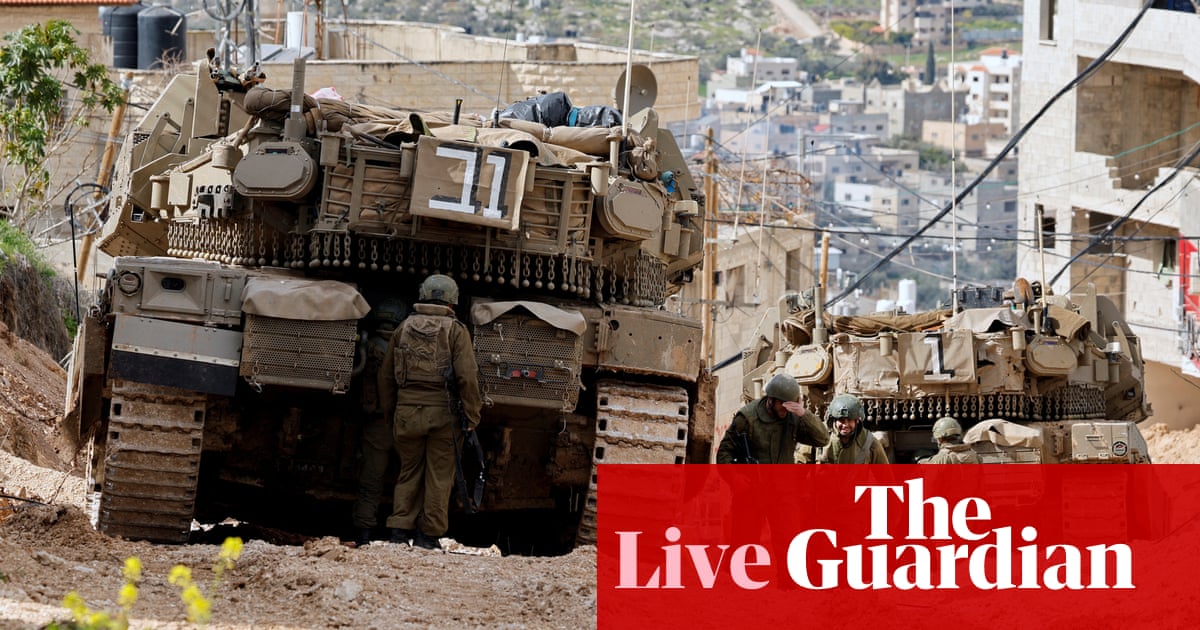Netanyahu ‘preparing atmosphere’ to return to waging war on Gaza – Hamas official
Hamas official Basem Naim has been talking to Al Jazeera about the precarious Gaza ceasefire deal which looks increasingly like it will collapse. As a reminder, Benjamin Netanyahu has delayed the handover of 620 Palestinians indefinitely as he is demanding Hamas stop what he called its “cynical use of hostages for propaganda”.
Naim – a member of Hamas’s political bureau – said the Israeli prime minister is “intentionally sabotaging” the truce agreement. He told Al Jazeera:
Before going to the next step, we have to be sure that the past step, which was releasing 620 prisoners, are already released.
Because Netanyahu is clearly sending strong messages that he is intentionally sabotaging the deal; he is preparing the atmosphere for returning back to the war.
Therefore what are the guarantees that he might take the other four bodies and again not release the agreed upon number of Palestinians plus the 620 Palestinians?

The release of 620 Palestinian prisoners had been delayed for several hours and was meant to occur just after six Israeli hostages were released on Saturday. It was meant to be the largest one-day prisoner release in the Gaza ceasefire’s first phase. Five of the six hostages freed on Saturday had been escorted by masked, armed militants in front of a crowd – a display that the UN and Red Cross have criticised as cruel after previous handovers.
Hamas had previously said it would release four bodies this week, completing the truce’s first phase, but this is now in doubt. Netanyahu has appeared reluctant to talk about the second phase of the three-stage ceasefire agreement, which would involve a complete Israeli military withdrawal from Gaza.

Key events
Closing summary
-
Hamas official Basem Naim told Al Jazeera that Benjamin Netanyahu is “intentionally sabotaging” the Gaza ceasefire agreement, which looks more fragile than ever after Israel indefinitely delayed the release of over 600 Palestinian prisoners. Netanyahu is “preparing the atmosphere for returning back to the war”, Naim said.
-
The UN secretary general, Antonio Guterres, said he was “gravely concerned” about “rising violence” in the occupied West Bank after the Israeli military sent tanks into the West Bank for the first time in more than two decades.
-
The Israeli defence minister, Israel Katz, said the latest raid across the West Bank was expanding, and that troops would remain in the area’s urban hotspots “for the coming year”, meaning approximately 40,000 people displaced by the assault will not be able to return to their homes.
-
Friedrich Merz, the Conservative leader who is expected to be Germany’s next chancellor, said Benjamin Netanyahu “can visit” his country despite an arrest warrant for the Israeli prime minister issued by the international criminal court (ICC) for alleged war crimes relating to Israel’s assault on Gaza.
We are closing this blog now. Thanks for following along. You can find all of our latest Middle East coverage here.
Long-term effects of Gaza war could quadruple Palestinian death toll, warn UK doctors

Mark Townsend
Mark Townsend is a senior global development reporter at the Guardian
British doctors who worked in Gaza during the war have issued dire predictions over the long-term health of Palestinian civillians, warning that large numbers will continue to die.
The prevalence of infectious disease and multiple health problems linked to malnutrition, alongside the destruction of hospitals and killing of medical experts, meant mortality rates among Palestinians in Gaza would remain high after the cessation of Israeli shelling.
British-Palestinian reconstructive surgeon, Prof Ghassan Abu-Sittah, who worked in al-Shifa and al-Ahli Arab hospitals in Gaza City shortly after the war began, said levels of malnutrition there were so acute that many children would “never recover”.
Scientists have estimated that the total deaths from Israel’s war on Gaza could ultimately be as high as 186,000. The figure is almost four times higher than the 46,700 deaths that Gaza’s Hamas-run health ministry have reported.
You can read the full story here:
Here are some more comments made by Friedrich Merz at the Berlin press conference that are being carried by Reuters. “I think it is a completely absurd idea that an Israeli prime minister cannot visit the federal republic of Germany,” Merz was quoted as saying.
The Left party in Germany called the likely next chancellor’s invitation a “disaster” and accused him of “double standards”.
Germany had always stressed that international arrest warrants would be executed, said co-leader Jan van Aken, referring to an ICC warrant for Russia’s president, Vladimir Putin.
“If Vladimir Putin comes to Germany, then this arrest warrant must be implemented. The same applies to Netanyahu,” he said.
Merz says Netanyahu ‘can visit’ Germany despite ICC warrant for alleged Gaza war crimes
Friedrich Merz, the Conservative leader who is expected to be Germany’s next chancellor, has been speaking at a press conference in Berlin.
He said Benjamin Netanyahu “can visit” his country despite an arrest warrant for the Israeli prime minister issued by the international criminal court (ICC) for alleged war crimes relating to Israel’s assault on Gaza.
Merz told journalists:
In the event that he plans to visit Germany, I have also promised myself that we will find a way to ensure that he can visit Germany and leave again without being arrested.
Netanyahu last year became the first leader of a “western-style” democracy to have an arrest warrant issued in his name by the ICC. The court also issued warrants for his former defence secretary, Yoav Gallant, and the slain Hamas military leader, Mohammed Deif.
As my colleague Haroon Siddique notes in this explainer, the ICC relies on 124 member states of the Rome statute, which established the court, to execute arrest warrants. Member states, which include Germany, are obliged to arrest individuals wanted by the ICC who set foot on their territory and, while they do not always do so, it means that the accused will have to consider whether they are willing to risk travelling.
Here are some of the latest images that have been sent to us over the newswires:
According to a report from Hebrew media outlet Ynet, Israel has told international mediators that it will release more than 600 Palestinian prisoners who were initially scheduled for release on Saturday if Hamas returns four bodies today without any ceremony. The Guardian has not confirmed this report.
Israel suspended the handover of 620 Palestinians it was due to free from its prisons on Saturday, putting the ceasefire agreement in jeopardy after Benjamin Netanyahu criticised what he called “disgraceful ceremonies that dishonour our hostages and the cynical use of hostages for propaganda”.
Here are some more of Hamas official Basem Naim’s comments, as summarised by Al Jazeera:
-
We have fulfilled all our obligations according to the deal.
-
Unfortunately, all the time Netanyahu and his government have been trying to undermine and sabotage the deal.
-
They have committed a lot of violations – killed more than 100 Palestinians, prevented most of the basic needs of the Palestinians to enter the Gaza Strip, and lastly refused to release more than 600 Palestinian prisoners.
-
We have conveyed a clear and strong message to the mediators: We cannot continue talking or discussing any further steps if these 620 Palestinians are not released.
Netanyahu ‘preparing atmosphere’ to return to waging war on Gaza – Hamas official
Hamas official Basem Naim has been talking to Al Jazeera about the precarious Gaza ceasefire deal which looks increasingly like it will collapse. As a reminder, Benjamin Netanyahu has delayed the handover of 620 Palestinians indefinitely as he is demanding Hamas stop what he called its “cynical use of hostages for propaganda”.
Naim – a member of Hamas’s political bureau – said the Israeli prime minister is “intentionally sabotaging” the truce agreement. He told Al Jazeera:
Before going to the next step, we have to be sure that the past step, which was releasing 620 prisoners, are already released.
Because Netanyahu is clearly sending strong messages that he is intentionally sabotaging the deal; he is preparing the atmosphere for returning back to the war.
Therefore what are the guarantees that he might take the other four bodies and again not release the agreed upon number of Palestinians plus the 620 Palestinians?
The release of 620 Palestinian prisoners had been delayed for several hours and was meant to occur just after six Israeli hostages were released on Saturday. It was meant to be the largest one-day prisoner release in the Gaza ceasefire’s first phase. Five of the six hostages freed on Saturday had been escorted by masked, armed militants in front of a crowd – a display that the UN and Red Cross have criticised as cruel after previous handovers.
Hamas had previously said it would release four bodies this week, completing the truce’s first phase, but this is now in doubt. Netanyahu has appeared reluctant to talk about the second phase of the three-stage ceasefire agreement, which would involve a complete Israeli military withdrawal from Gaza.
Friedrich Merz, the Conservative leader who looks set to be the next German chancellor after his CDU/CSU came first in the German elections yesterday, has had a “warm” phone conversation with Israel’s prime minister, according to Benjamin Netanyahu’s office.
Netanyahu’s office said:
Chancellor-designate Merz thanked the prime minister for the conversation and said that he would invite him to make an official visit to Germany, in overt defiance of the scandalous International Criminal Court decision to label the prime minister a war criminal.
Merz has pledged to further cement Germany’s already generous military support for Israel. Berlin has provided about 30% of Israel’s foreign-sourced weapons, according to analysis published last year, making Germany by far the biggest arm supplier to Israel in Europe, and second to the US globally. He has also vowed to end the so-called “embargo” on arms exports to Israel imposed by the outgoing government led by Olaf Scholz (this is the same coalition that, according to Hareetz, approved over $164m in arms exports to Israel in 2024, though senior figures did reportedly withhold approval for arms exports late last year pending assurances from Israel that it would not use German weapons in a genocide. The German government has maintained there is no arms embargo against Israel, but arms sales approvals did significantly come down in 2024 compared to 2023).
Israel and Hamas have committed ‘grave violations’ of international law in Gaza – UN rights chief
Volker Turk, the UN high commissioner for human rights, has been speaking at the human rights council in Geneva (you can see the UN secretary general’s comments in the post at 09.08).
Turk said:
In Israel and the occupied Palestinian territory, where the suffering has been unbearable, I repeat my call for an independent investigation into grave violations of international law, committed by Israel in the course of its attacks across Gaza, and by Hamas and other Palestinian armed groups.
Any sustainable solution must be based on accountability, justice, the right to self-determination, and the human rights and dignity of both Israelis and Palestinians.
Israel’s prime minister, Benjamin Netanyahu, said yesterday that Israel will not allow Syria’s new army or Hayat Tahrir al-Sham (HTS) to “enter the area south of Damascus” as his government made clear Israeli forces would stay in parts of southern Syria for an indefinite period.
Speaking at a military graduation yesterday, he said:
Take note: We will not allow HTS forces or the new Syrian army to enter the area south of Damascus.
We demand the complete demilitarisation of southern Syria in the provinces of Quneitra, Daraa and Suwayda from the forces of the new regime.
Likewise, we will not tolerate any threat to the Druze community in southern Syria.
Former Al Qaeda affiliate HTS took control of Damascus in early December in a rapid offensive that led to the ousting of former Syrian president Bashar al-Assad.
Shortly after the fall of the Assad regime, Israeli troops seized control of a demilitarised zone between Syria and the Israeli-occupied Golan Heights, despite widespread condemnation of the occupation as a violation of international law.
Syria has demanded Israel withdraw its forces from the country. The UN is among the bodies saying Israel’s move into Syrian territory is a violation of international agreements and has also called for the troops to be withdrawn.
UN ‘gravely concerned by rising violence’ in occupied West Bank
The UN secretary general, Antonio Guterres, has been speaking at the UN human rights council in Geneva.
“I am gravely concerned by the rising violence in the occupied West Bank by Israeli settlers and other violations, as well as calls for annexation,” Guterres said, as he urged for the ceasefire agreement between Hamas and Israel to remain intact.
He added that human rights around the world are being “suffocated” and referred to intolerable levels of death and destruction in Gaza. More than 48,000 Palestinian people have been killed by Israeli attacks since 7 October 2023, according to the local health ministry. Settler attacks and deadly raids by Israeli forces have both intensified in the occupied West Bank since the start of the war.
Deployment of tanks to West Bank and extended Israeli presence there is ‘flagrant attempt to entrench genocide’ – Palestinian foreign ministry
In a post on X, the Palestinian foreign ministry said deploying tanks around the city of Jenin in the occupied West Bank is a “a prelude to expanding its (Israel’s) crimes against the Palestinian people”.
It said:
The ministry of foreign affairs and expatriates warns of the Israeli occupation army’s deployment of heavy tanks around Jenin, viewing it as a prelude to expanding its crimes against the Palestinian people – particularly in the northern West Bank and its refugee camps.
This escalation comes as Israeli ‘defence’ minister Israel Katz boasts that the Israeli occupation army will prevent displaced Palestinians from returning to their homes and has ordered an extended military presence in the area. Israeli occupation forces have already forcibly displaced 40,000 Palestinians from refugee camps in the northern West Bank. The ministry views these developments – including Katz’s statements, the deployment of tanks, and the deliberate intimidation of defenceless civilians- as a grave escalation in the West Bank and a flagrant attempt to entrench genocide and forced displacement against our unarmed people.
The ministry renews its urgent calls on the international community to intervene immediately to curb Israel’s unchecked aggression, which continues in blatant violation of international law and signed agreements, and compel it to end its assault on the Palestinian people and their fundamental rights, foremost among them is their inalienable right to remain on their land.
My colleague Bethan McKernan has written about the expansion of Israel’s deadly military operation in the occupied West Bank. Here is an extract from her piece:
The Israel Defense Forces said they were sending tanks to the northern city of Jenin for the first time since the height of the second intifada, or Palestinian uprising, in 2002.
Israel’s latest operation in the West Bank, launched two days after the ceasefire in Gaza came into effect on 19 January, has killed more than 50 people and ripped up roads and infrastructure in the territory’s refugee camps, set up to house Palestinians displaced after the creation of Israel in 1948.
Today the camps resemble urban slums, and have long functioned as bastions of armed resistance to the occupation.
The Israeli army began large-scale operations in the West Bank in the spring of 2022 after a spate of Palestinian attacks against Israelis, and violence there has soared since the Hamas attacks of 7 October 2023 that ignited the latest war in Gaza.
Tensions in the West Bank have risen further since Thursday night after a series of bus explosions near Tel Aviv that appeared to detonate early, causing no casualties. In a Telegram post, a branch of Hamas’ military wing, Izz ad-Din al-Qassam Brigades, from the West Bank city of Tulkarem, praised the attacks but stopped short of taking responsibility.
Israel sends tanks into West Bank as Gaza ceasefire in doubt with first phase nearing its end
Welcome to our continuing live coverage of developments in the Middle East.
Hamas released six Israeli hostages on Saturday, but Israel suspended the handover of more than 600 Palestinians it was due to free from its prisons in exchange, putting the fragile ceasefire agreement in jeopardy.
Israeli prime minister Benjamin Netanyahu has delayed the handover indefinitely as he is demanding Hamas stop what he called its “cynical use of hostages for propaganda”.
“It has been decided to delay the release of terrorists that was planned for Saturday until the release of the next hostages is ensured, without the humiliating ceremonies,” he said.
In response, Hamas official Basem Naim told Reuters on Sunday that the Palestinian militant group will not hold talks with Israel through mediators on any further steps in the ceasefire agreement unless Palestinian prisoners are released as agreed.
As tensions over the ceasefire agreement rise, Netanyahu vowed yesterday to achieve the war’s stated objectives in negotiations “or by other means”.
“We are prepared to resume intense fighting at any moment,” he said.
Meanwhile, the Israeli military has sent tanks into the occupied West Bank for the first time in more than two decades, with raids reported in numerous locations such as Hebron and Qabatiya.
The Israeli defence minister, Israel Katz, said the latest raid across the West Bank was expanding, and that troops would remain in the area’s urban hotspots “for the coming year”, meaning approximately 40,000 people displaced by the assault will not be able to return to their homes.
-
Israeli foreign minister Gideon Saar will meet senior European officials in Brussels later today. He will co-chair a meeting of the EU-Israel Association Council with EU foreign policy chief Kaja Kallas in the first such session since 2022. The talks are set to focus on the humanitarian crisis in Gaza – caused by Israel’s assault on the territory – and changing regional dynamics.
-
The White House said it supports Israel’s decision to delay releasing 600 Palestinian prisoners, citing the “barbaric treatment” of Israeli hostages by Hamas.
Delaying the prisoner release is an “appropriate response” to the militant group’s treatment of the hostages, national security council spokesperson Brian Hughes said. Donald Trump is prepared to support Israel in “whatever course of action it chooses regarding Hamas,” he added. -
US President Donald Trump’s envoy Steve Witkoff said he was headed to the Middle East this week to “get an extension of phase one” of the truce. “We’re hopeful that we have the proper time… to begin phase two, and finish it off and get more hostages released,” Witkoff told CNN. The first phase of the three-stage ceasefire agreement is due to end in just under a week’s time. Delayed talks on the second stage of the deal, which is supposed to involve a complete Israeli withdrawal from Gaza, are due to start this week, but there is uncertainty about whether they will happen and if they do what kind of lasting result can be secured.










